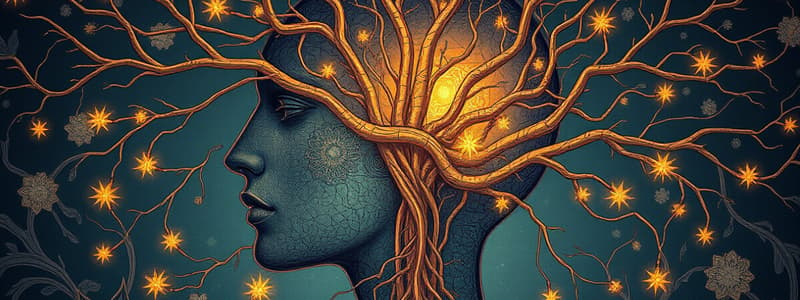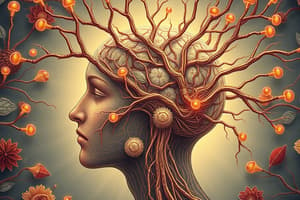Podcast
Questions and Answers
What are the two main divisions of the human nervous system?
What are the two main divisions of the human nervous system?
- The central nervous system (correct)
- The autonomic nervous system
- The peripheral nervous system (correct)
- The somatic nervous system
What are the two parts of the central nervous system?
What are the two parts of the central nervous system?
The brain and the spinal cord
What are the divisions of the peripheral nervous system?
What are the divisions of the peripheral nervous system?
The somatic nervous system and the autonomic nervous system
What are the divisions of the autonomic nervous system?
What are the divisions of the autonomic nervous system?
What are the three components of a neuron?
What are the three components of a neuron?
How do neurons communicate with one another?
How do neurons communicate with one another?
What are neurotransmitters?
What are neurotransmitters?
What are endorphins?
What are endorphins?
What are hormones?
What are hormones?
What techniques do researchers use for understanding the workings of the brain?
What techniques do researchers use for understanding the workings of the brain?
What are the major functions of the brain stem, cerebellum, and thalamus?
What are the major functions of the brain stem, cerebellum, and thalamus?
What are the major functions of the hypothalamus, amygdala, and hippocampus?
What are the major functions of the hypothalamus, amygdala, and hippocampus?
What are the four lobes of the cerebral cortex and their major functions?
What are the four lobes of the cerebral cortex and their major functions?
How do studies of split-brain patients help researchers understand the functions of the left and right cerebral hemispheres?
How do studies of split-brain patients help researchers understand the functions of the left and right cerebral hemispheres?
What are some arguments in favor of and against the conclusion that women's and men's brains differ anatomically and functionally?
What are some arguments in favor of and against the conclusion that women's and men's brains differ anatomically and functionally?
Flashcards are hidden until you start studying
Study Notes
Nervous System
- Divided into two main parts: central nervous system (CNS) and peripheral nervous system (PNS).
- The CNS is composed of the brain and spinal cord.
- The PNS branches into the somatic nervous system (voluntary control) and the autonomic nervous system (involuntary control).
Autonomic Nervous System
- Subdivided into sympathetic (fight or flight response) and parasympathetic (rest and digest) systems.
Neurons
- Composed of three main components: dendrites (receive signals), cell body (processes signals), and axon (sends signals).
- Neurons communicate through electrical impulses and neurotransmitters across synaptic clefts, facilitating inter-neuronal communication.
Neurotransmitters
- Chemical substances released by transmitting neurons at synapses that influence the activity of receiving neurons.
- Examples include endorphins, which reduce pain and enhance pleasure.
Hormones
- Chemical substances secreted by glands that regulate various bodily functions and affect the performance of other organs.
Brain Research Techniques
- Researchers utilize needle electrodes, transcranial magnetic stimulation, PET scans, and MRIs to investigate brain functioning.
Major Brain Structures
- The brain stem controls basic life functions like breathing, heartbeat, and blood pressure.
- The cerebellum is essential for balance and smooth muscular coordination.
- The thalamus acts as a relay station, directing sensory information to appropriate brain areas.
Limbic System Functions
- The hypothalamus regulates hunger, thirst, emotions, temperature, and autonomic functions, along with circadian rhythms.
- The amygdala evaluates emotional significance of sensory inputs and influences responses.
- The hippocampus is involved in memory processing and learning from past experiences.
Cerebral Cortex Lobes
- Occipital lobes house the visual cortex for processing visual information.
- Parietal lobes contain the somatosensory cortex, which processes sensory data related to touch and temperature.
- Temporal lobes are linked to memory, emotion, and auditory processing.
- Frontal lobes feature the motor cortex, coordinating voluntary muscle movements.
Split-Brain Studies
- Research on split-brain patients aids in understanding lateralization of brain function, helping to localize specific problem areas effectively.
Gender Differences in Brain Function
- Gender differences in brain anatomy and function may reinforce stereotypes rather than explain behaviors.
- Differences could be reflective of behavioral results rather than causes.
Studying That Suits You
Use AI to generate personalized quizzes and flashcards to suit your learning preferences.




